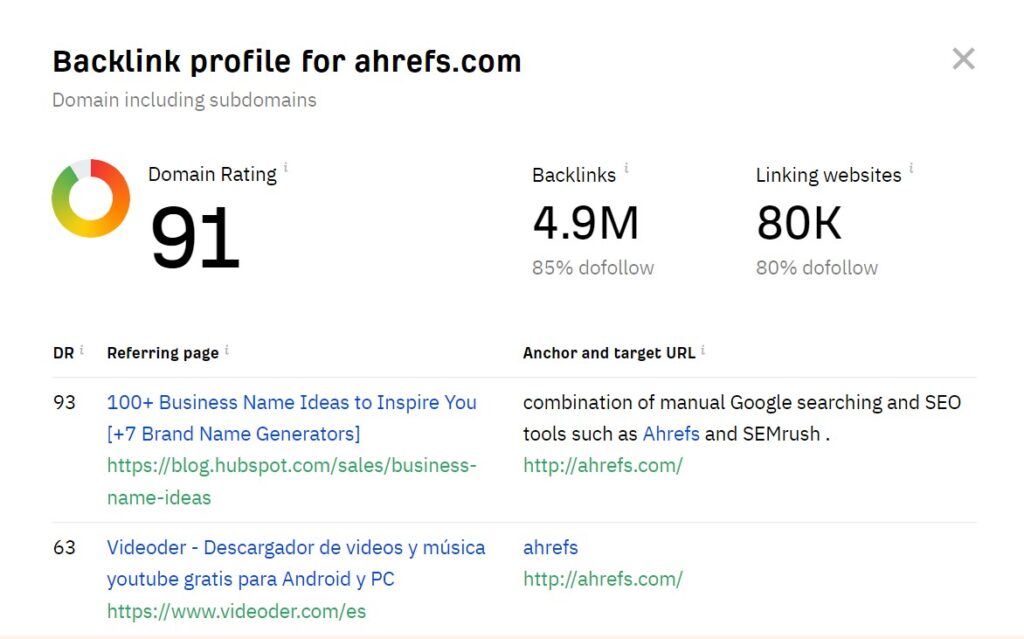Various factors influence how well a website ranks on search engine results pages (SERPs). One of the key metrics used to evaluate a website’s ranking potential is Domain Authority (DA).
Domain Authority measures a website’s credibility and influence within its niche. Building a strong DA is a gradual process that requires a strategic, long-term approach focused on organic growth.
By consistently creating high-quality content and acquiring strong backlinks, you can increase your DA and rank higher in search results. While some improvements may be noticeable after a few months, achieving a high DA often takes years of consistent work.
1. How is Domain Authority Measured?
Several factors contribute to a website’s Domain Authority, and understanding these elements can help improve your websites search engine ranking potential.
a. Backlinks
One of the most significant factors influencing DA is the number and quality of backlinks your website receives. Backlinks are links from other websites that point to your site. Search engines consider backlinks as endorsements—when a site with high authority links to your content, it signals to search engines that your website is trustworthy and valuable.
b. Quality of Information
Content quality plays an important role in determining a website’s authority. Websites that publish well-researched, informative, and engaging content are more likely to attract organic traffic and earn backlinks from reputable sources. If your content consistently provides value, search engines will recognize your site as an authority in your field.
Related: Essential Ingredients: 9 Elements of a Successful Website
c. Competitive Landscape
A website’s Domain Authority is also influenced by competition within its niche. If you operate in a highly competitive industry where many websites have strong DA scores, it may take longer to establish authority. However, in less competitive niches, building authority can be more achievable with strategic content creation and link-building efforts.
d. Dofollow vs. Nofollow Links
Not all backlinks carry the same weight. Search engines differentiate between dofollow and nofollow links.
- Dofollow links pass authority from one site to another, making them valuable for increasing DA.
- Nofollow links do not pass authority, as they tell search engines not to consider the link for ranking purposes.
For a strong Domain Authority, websites should aim for at least 80% of their backlinks to be dofollow links. A higher proportion of dofollow links signals to search engines that a site is well-regarded and influential.
2. What is a good Domain Authority?

Domain Authority is measured on a scale from 1 to 100, with higher scores indicating a stronger, more authoritative website. While a perfect score of 100 is nearly impossible to achieve, different score ranges indicate varying levels of authority:
- 40–50: Considered average
- 50–60: Rated as good
- 60 and above: Considered excellent
For small business websites, a Domain Authority of around 40 can be seen as a strong score, especially if SEO efforts are still in progress. The key is to focus on consistent improvements over time rather than aiming for an unrealistic score.
3. How to Check Domain Authority
There are several online tools that allow you to check your website’s Domain Authority:
- Moz – Provides a DA score along with backlink analysis.
- SEMrush – Offers domain authority insights as part of its SEO toolkit.
- Ahrefs – Measures Domain Rating (DR), which is similar to DA and focuses on backlink strength.
Using these tools, you can easily track your progress and identify areas for improvement in your SEO strategy.
4. Domain Authority and SEO
Domain Authority is an important metric for understanding a website’s ability to rank in search engine results, but it is not a direct ranking factor used by search engines like Google. Instead, it serves as a comparative tool to measure how authoritative a site is relative to its competitors.
A higher DA generally correlates with better search engine rankings, as authoritative sites tend to have more high-quality backlinks, strong content, and a solid reputation. However, focusing solely on increasing DA without improving content quality and user experience will not yield significant SEO benefits.
Related: Boost Your Website Rankings Without SEO Experience – The Ultimate Guide

5. Why Domain Authority Matters
Websites with a higher Domain Authority (DA) have a greater chance of ranking for competitive keywords. Search engines recognize authoritative sites as more reliable sources of information, making them more likely to appear at the top of search results.
A strong DA also builds trust and credibility. When a website is considered authoritative, both users and other websites view its content as valuable and reliable. This can lead to increased engagement, more returning visitors, and a stronger reputation.
Additionally, websites with high DA scores attract more backlinks, further reinforcing their authority. Other sites are more likely to link to well-established sources, creating a cycle where increased authority leads to even more link-building opportunities.
6. Limitations
While DA is useful, it should not be the sole focus of an SEO strategy. Google does not use DA directly in its ranking algorithm, meaning a lower DA site can still outrank a higher DA site if it has better content, stronger keyword optimization, and a superior user experience.
To maximize SEO success, businesses should use DA as one of many SEO indicators, alongside keyword research, page optimization, content strategy, and user engagement metrics.
7. How to Improve Domain Rating

Backlinks are one of the most important factors in improving Domain Rating (DR) and overall website authority. However, it is important to acquire backlinks naturally by earning mentions and forming partnerships within your industry. Search engines prioritize high-quality, relevant links over a high quantity of low-value ones.
A strong backlink profile can significantly impact your site’s DR, as backlinks serve as a measure of credibility and trustworthiness. To build high-quality backlinks, consider the following strategies:
a. Find Backlink Opportunities with Top Referral Sources
Analyze where your current backlinks are coming from and identify high-authority websites that frequently link to similar content. Reaching out to these sites with valuable resources can increase your chances of earning backlinks.
b. Use Outbound Links to Form Partnerships
Linking to other authoritative sites in your content can create opportunities for reciprocal partnerships. When you provide value by referencing quality sources, those websites may eventually link back to you.
c. Leverage Google Search Console Reports
Google Search Console provides insights into which websites are linking to yours. Use this data to identify link-building opportunities and track your backlink growth over time.
d. Monitor Your Competitors
Researching your competitors’ backlink profiles can reveal valuable link sources. If authoritative sites are linking to your competitors, you may be able to reach out and offer better content to earn similar or even better links.
e. Find and Fix Broken Links
Websites often have broken links that lead to removed or outdated content. By identifying broken links on high-authority sites and offering your content as a replacement, you can earn new backlinks while helping site owners maintain a good user experience.
f. Create High-Quality Content
The best way to earn organic backlinks is by consistently publishing valuable, informative, and shareable content. Well-researched blog posts, case studies, infographics, and in-depth guides are more likely to be linked by other sites.
g. Remember: Quality Over Quantity
While obtaining backlinks is essential, it is more important to focus on quality rather than quantity. A few backlinks from high Domain Rating (DR) websites are far more valuable than numerous links from low-authority sites. Prioritize backlinks from reputable sources to strengthen your site’s authority and search rankings.
Related: Google Quality Ratings: How E-A-T and Y-M-Y-L Impact Your Website
8. How to Grow and Maintain Domain Authority

Monitoring your Domain Authority (DA) regularly can help you track your website’s growth and evaluate the effectiveness of your SEO strategy. However, since DA does not change overnight, it is best to check it periodically rather than daily.
Tip: Use a website like Ahrefs Backlink Checker to monitor Domain Authority.
Domain Authority Task List
1. Monthly: Checking DA once a month allows you to track trends without getting caught up in small fluctuations.
2. Quarterly: If your website is stable, a quarterly review may be sufficient to assess long-term progress.
3. After Major SEO Changes: If you have made significant updates, such as launching a link-building campaign or redesigning your website, check DA a few months later to measure its impact.
What to Look for When Monitoring DA
When reviewing your DA score, consider these factors:
1. Backlink Growth: Are you gaining high-quality backlinks over time?
2. Competitor Comparison: How does your DA compare to others in your niche?
3. Traffic and Rankings: Are increases in DA translating into better search engine visibility?
4. Link Quality: Are new backlinks coming from authoritative sources?
Important: Avoid Overanalyzing Small Changes
DA fluctuates due to various factors, including updates in search engine algorithms. Small increases or decreases are normal, so focus on long-term growth trends rather than reacting to minor shifts. By monitoring DA consistently but not obsessively, you can make better decisions to improve your site’s authority and SEO performance.
Summary
Domain Authority (DA) is a valuable metric for assessing a website’s credibility and ranking potential in search engines. While it is not a direct ranking factor used by Google, a higher DA often correlates with better visibility in search results.
Factors such as high-quality backlinks, authoritative content, and competitive positioning all contribute to a website’s DA score. Improving DA requires a long-term approach, focusing on earning natural backlinks, producing valuable content, and monitoring site performance.
Regularly checking DA can help track SEO progress, but it is essential to prioritize quality over quantity when building backlinks. Instead of obsessing over small fluctuations, focus on sustainable growth strategies that enhance user experience and search rankings.
